CLAS 353
November 19, 2024
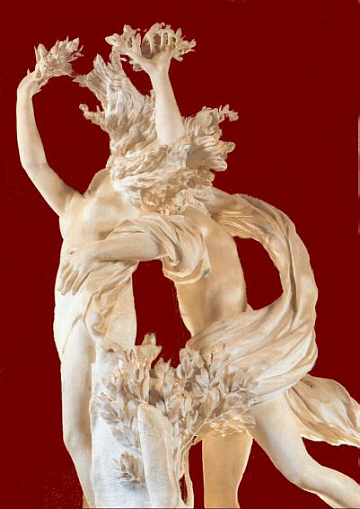
Bernini, Apollo & Daphne (ca. 1625)
Response #2: due Wednesday, December 11 (optional draft due Wednesday, November 27, 11:59 in D2L)
Ovid, Metamorphoses: idiosyncratic Ovidian epic in 15 books (cf. heroic, historical, didactic)
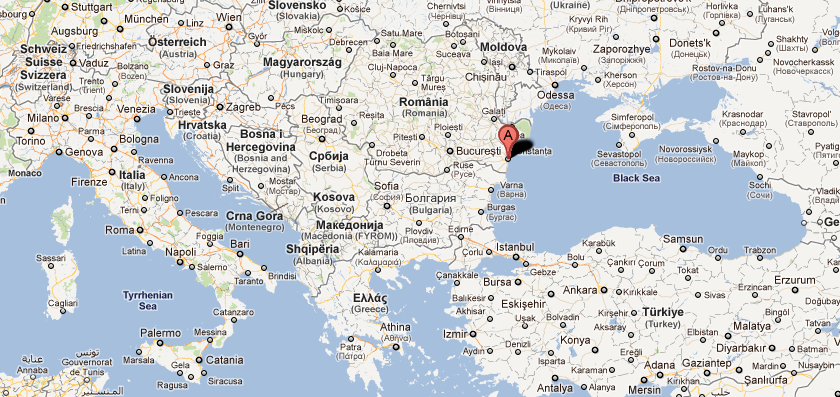
Publius Ovidius Naso (43 BCE-17 CE): from Sulmo (Sulmona), studied in Rome & Athens, abandons law career for poetry; poetic celebrity (Amores, "Loves", Ars Armatoria, "The Art of Love"); exiled to Tomis (8 CE) by Augustus for carmen ("poem” – Ars Armatoria & Augustus's moral legislation?) and error (“a mistake")
- Ovid's identification with Actaeon ("Looking")
.jpg)
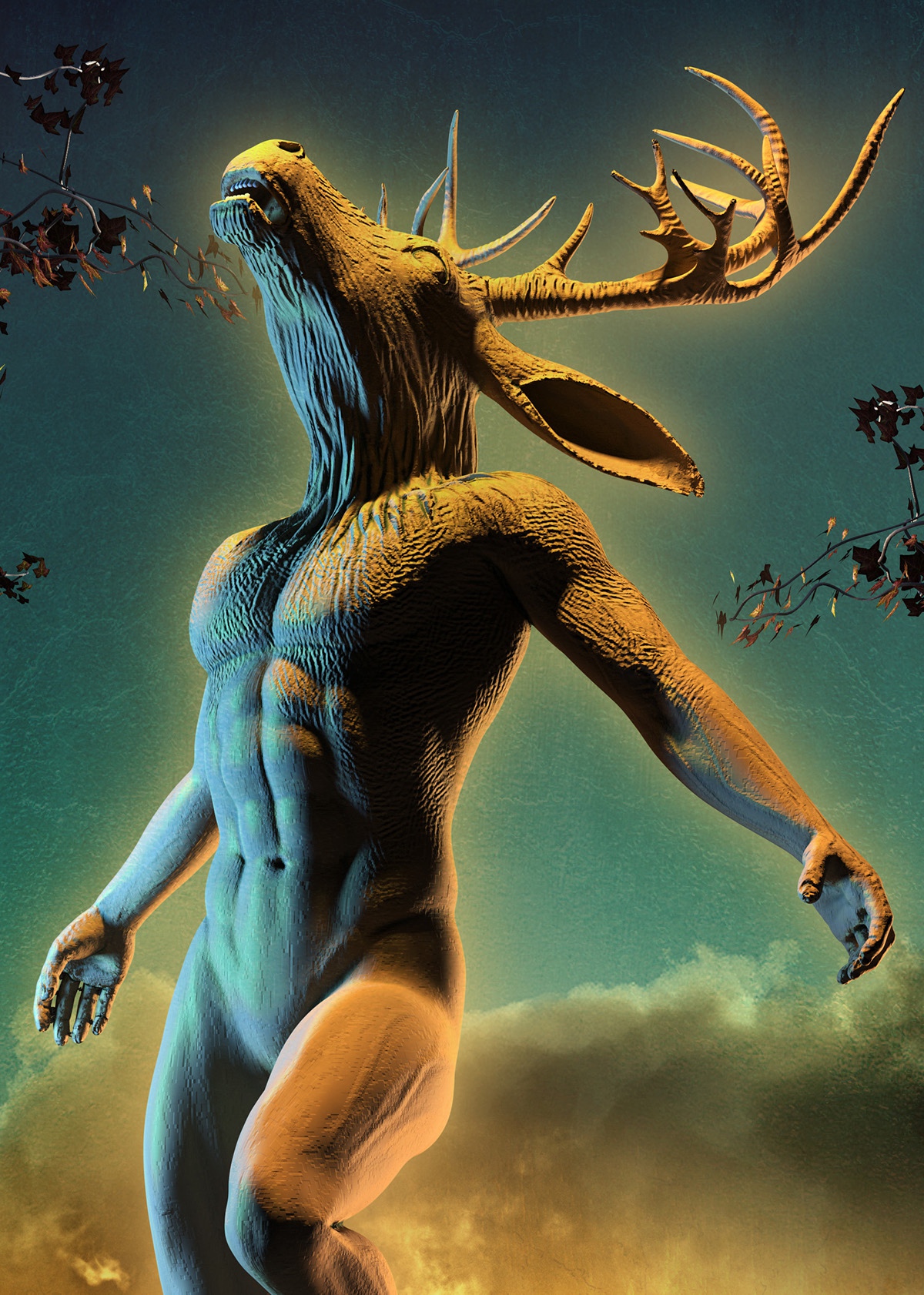
Death of Actaeon (Apulian red-figure skyphos, 400-350 BCE)
Metamorphoses 3.138-42 (Theban book)
Amid such happy times, Cadmus, your grandson
was first to cause you pain—strange antlers sprouting
from his brow, those dogs that drank their master's blood.
If you look closely, you blame the boy's Fortune,
not a crime. How can a mistake be a crime? [error]
Ovid, Tristia (autobiographical exile poem, "Sorrows") 2.103-10
Why did I see anything? Why make my eyes guilty?
Why was mischief, unwittingly, known to me?
Actaeon, unaware, saw Diana unclothed:
nonetheless he became his own hounds’ prey.
Even fate must be atoned for, among the powers that be,
to a wounded god chance is no excuse.
On that day, when my unlucky error misled me,
my house, humble, without stain, was destroyed.
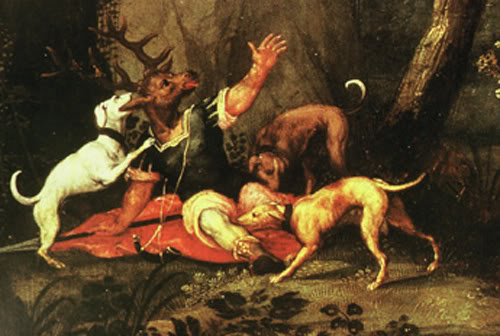
Pittoni the Younger, Diana & Actaeon (1721)
- Actaeon's silencing, loss of identity, alienation at hands of cruel, authoritative god ("Now you can tell everyone you've seen me undressed— / that is, if you can tell anything", 3.192-3) a repeated pattern in Metamorphoses
Metamorphoses 3.237-50 (pathos & grotesque paradox of hunter becoming hunted)
Soon no place is left to rip; he groans a sound
that doesn't seem
human but could be cried
by no stag and fills the hills he's known so well
with cries of grief, then on his knees he begs
not with pleading arms but with a silent face
His friends goad the frenzied pack with the usual
shouts, and they look for Actaeon, with no idea,
and bellow for Actaeon, as if he weren't there
(at his name he lifts his head), and they're mad
the slacker's missed the show and will not see the prize.
He'd rather miss this but he's there; he'd rather
see than feel his own dogs' ravenous ripping.
They cluster upon him, muzzles deep in his flesh,
and tear apart master falsely figured as a stag.
- angry god satisfied: "Not until all his many wounds wane away his life / is the fury of quivered Diana appeased" (3.51-2)
- Metamorphoses: published pre-exile (ca. 8 CE), but later post-exile edition (?): dactylic hexameters, unique direction for Roman epic (cf. Vergil’s focused national heroic epic & Ovid's distorted Aeneid, Metamorphoses 13.623-14.608)
- monumental collection ("tapestry") of 250 independent stories linked by metamorphosis [cf. Alexandrian Callimachus’s (fragmentary, 3rd BCE) Aetia, series of independent stories that are aetiological, Nicander’s (lost, 2nd BCE) Heteroeumena ("Metamorphoses")] – ultimate model for collective epic verse Hesiod’s Theogony (8th century BCE)
- "epic" scope of Metamorphoses: mythical creation of world (Metamorphoses 1) to apotheosis & catasterism of Julius Caesar & reign of Augustus (Metamorphoses 15)
Metamorphoses 1.1-4 (Ovid's program)
My intention is to tell of bodies changed
To different forms; the gods, who made the changes,
Will help me—or I hope so—with a poem
That runs from the world's beginning to our own days. [lit., gods asked to "weave" (deducite) continuous poem]
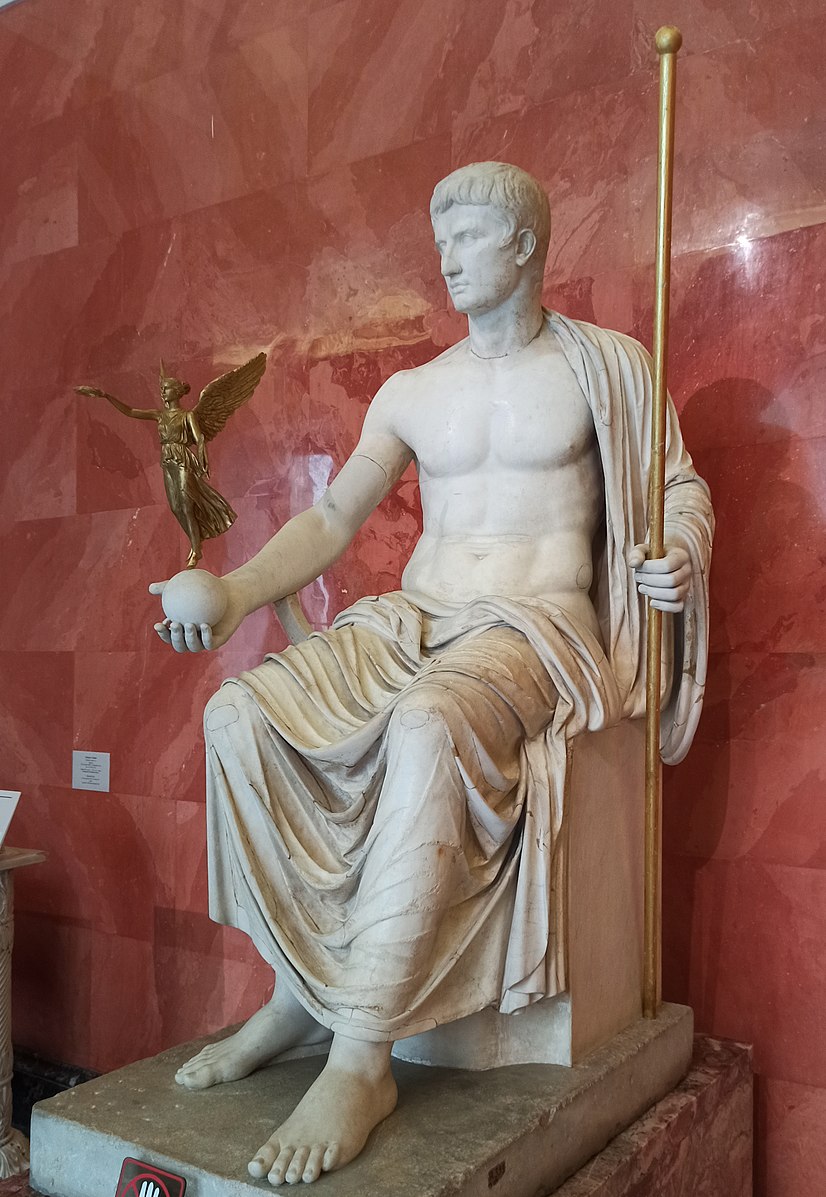
Augustus as Jupiter (1st century CE)
- Metamorphoses & Augustus – emperor repeatedly linked with dictatorial Jupiter, serial rapist in poem; ironic & irreverent treatment of Julius Caesar's deification (42 BCE) in closing panegyric:
"No work, in all of Caesar's great achievement, / Surpassed this greatness, to have been the father / Of our own Emperor . . . Greatness surpassed only be being father / Of one yet greater" (15.750ff.)
"We cannot think him mortal, our Augustus, / Therefore, our Julius must be made a god / To justify his son" (15.760-2)
- Ovid's bold self-prophecy – post-exile epilogue?
Metamorphoses, Epilogue (Ovid's forecasted poetic metamorphosis)
Now I have done my work. It will endure,
I trust, beyond Jove's anger, fire, and sword,
beyond Time's hunger. The day will come, I know,
So let it come, that day which has no power
Save over my body, to end my span of life
Whatever it may be. Still, part of me,
The better part, immortal, will be borne
Above the stars; my name will be remembered
Wherever Roman power rules the conquered lands,
I shall be read, and through all centuries
If prophecies of bards are truthful,
I shall be living, always.
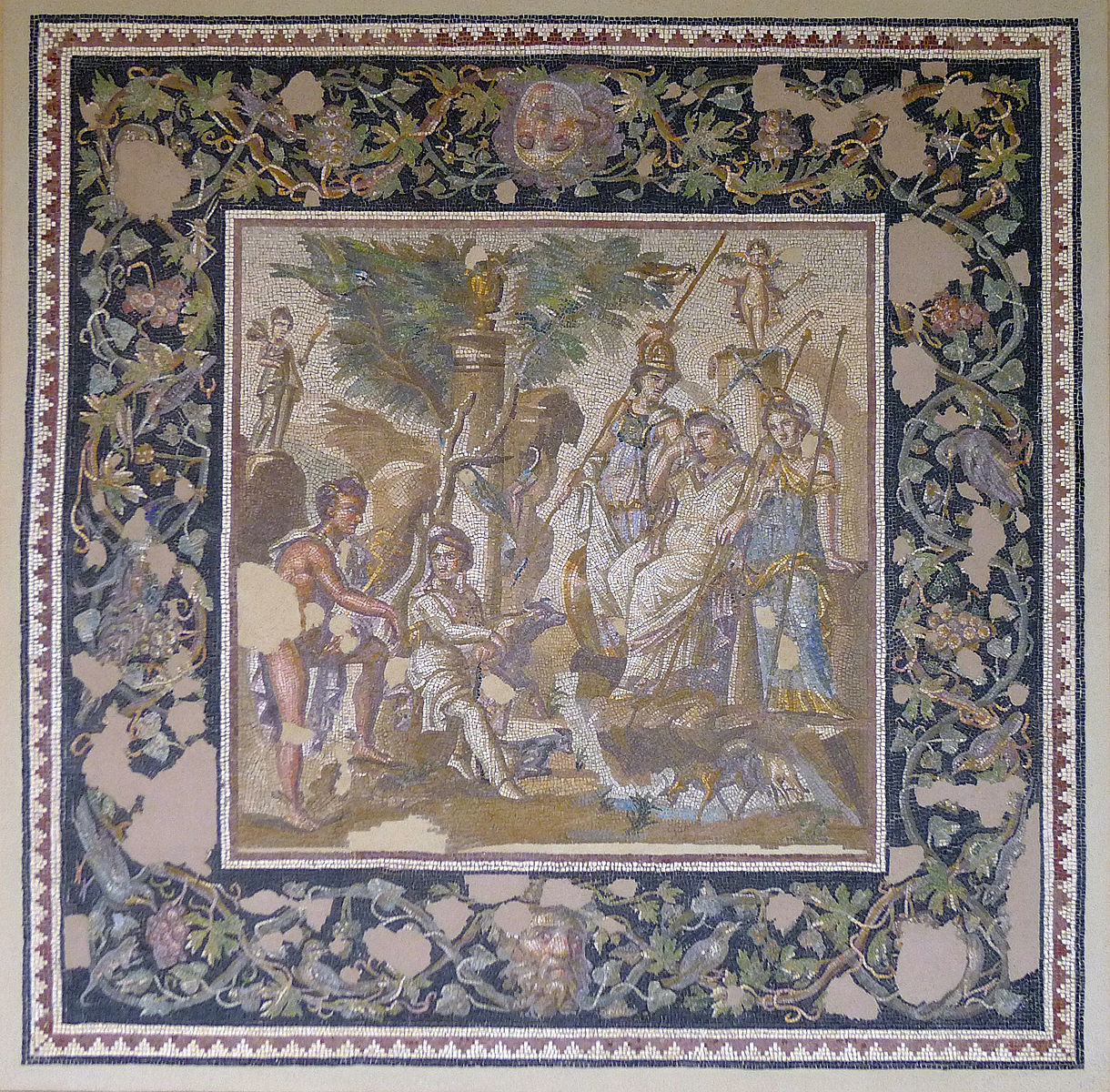
Judgement of Paris (mosaic from Antioch, ca. 150 CE)
- Metamorphoses: short, swift, fluid narratives (humorous, clever, shocking, sad, disturbing, fantastical, etc.); narrative complexity—nesting of stories to avoid catalogue-effect or single narrative voice > non-linear narrative with multiple storytellers
- virtuoso poet: variety of emotional tones, styles, genres (heroic epic, mock-epic, tragedy, comedy, elegy/love poetry, didactic)
- poem's unifying themes: appearance & reality, artistic representation & reality (e.g. Arachne's tapestry: "you'd think it's a real bull and a real sea", 6.104) in universe of dynamic flux/change (metamorphosis)

- Jane Alison's selection of erotic tales (Change Me: Stories of Sexual Transformation from Ovid): desire; transformative effects of desire in context of Roman elite culture; male gaze, male ownership of less privileged bodies > rape – pathos & empathy for victims? female agency? content/trigger warning
- Metamorphoses: powerfully descriptive & visual narrative tapestry, as Arachne's
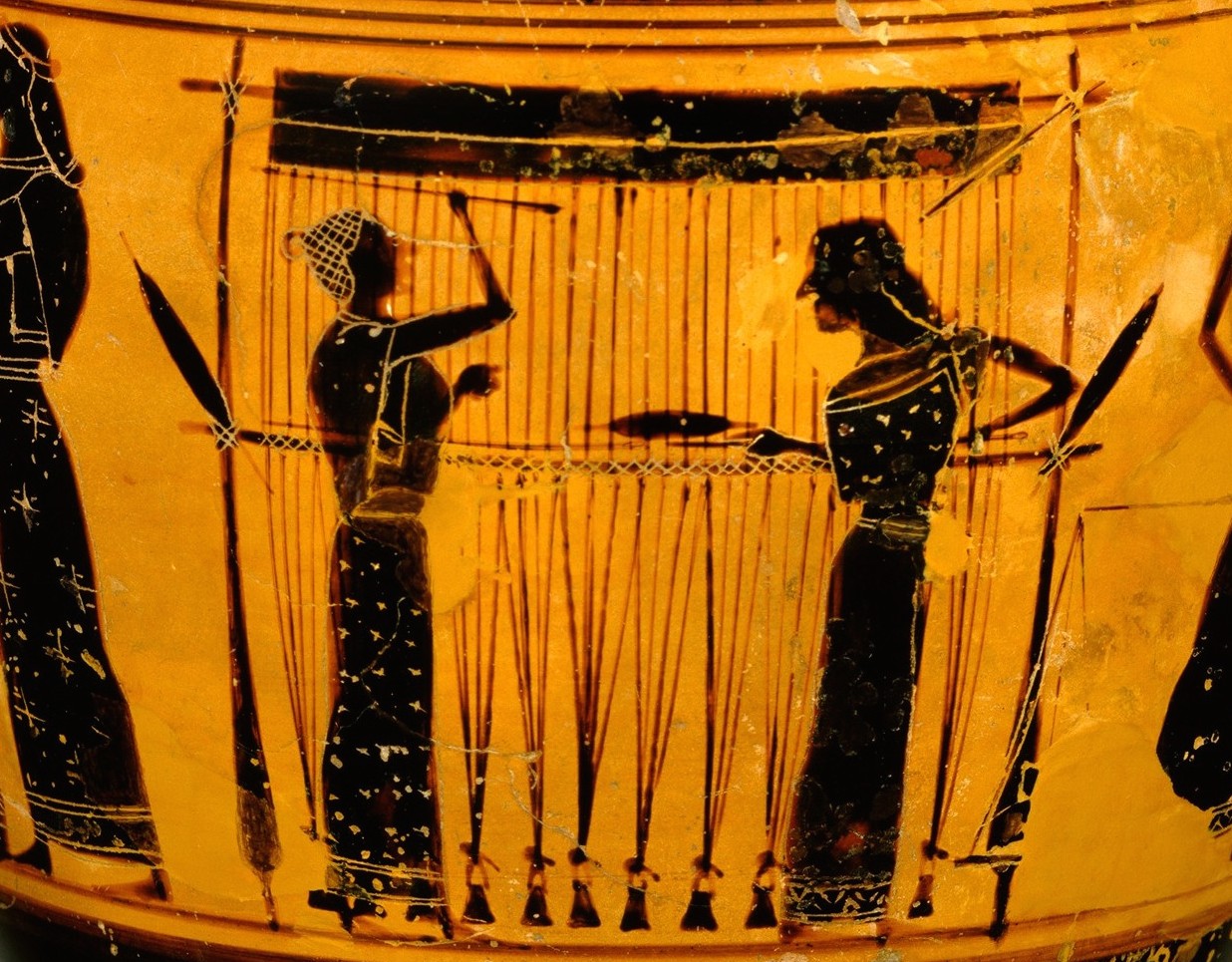
Ancient loom scene (black-figure lekythos, 550-530 BCE)
- Minerva's weaving contest with mortal Arachne (theme of challenging gods in Metamorphoses 6) – not "Looking" story but allegory about Ovid?
Metamorphoses 6.61-9 (contestants' artistry – Metamorphoses?)
Woven in purple concocted in Tyrian pots
and delicate shades that invisibly shift,
as when sunrays shine through a shower of rain
and a rainbow curves color across the wide sky;
in it glows the whole spectrum of hues,
but from one to the next a haze fools out eyes.
Each shade like the next, but the ends: so distant!
Woven in too is wiry gold thread—
and plotted into each web are old stories.
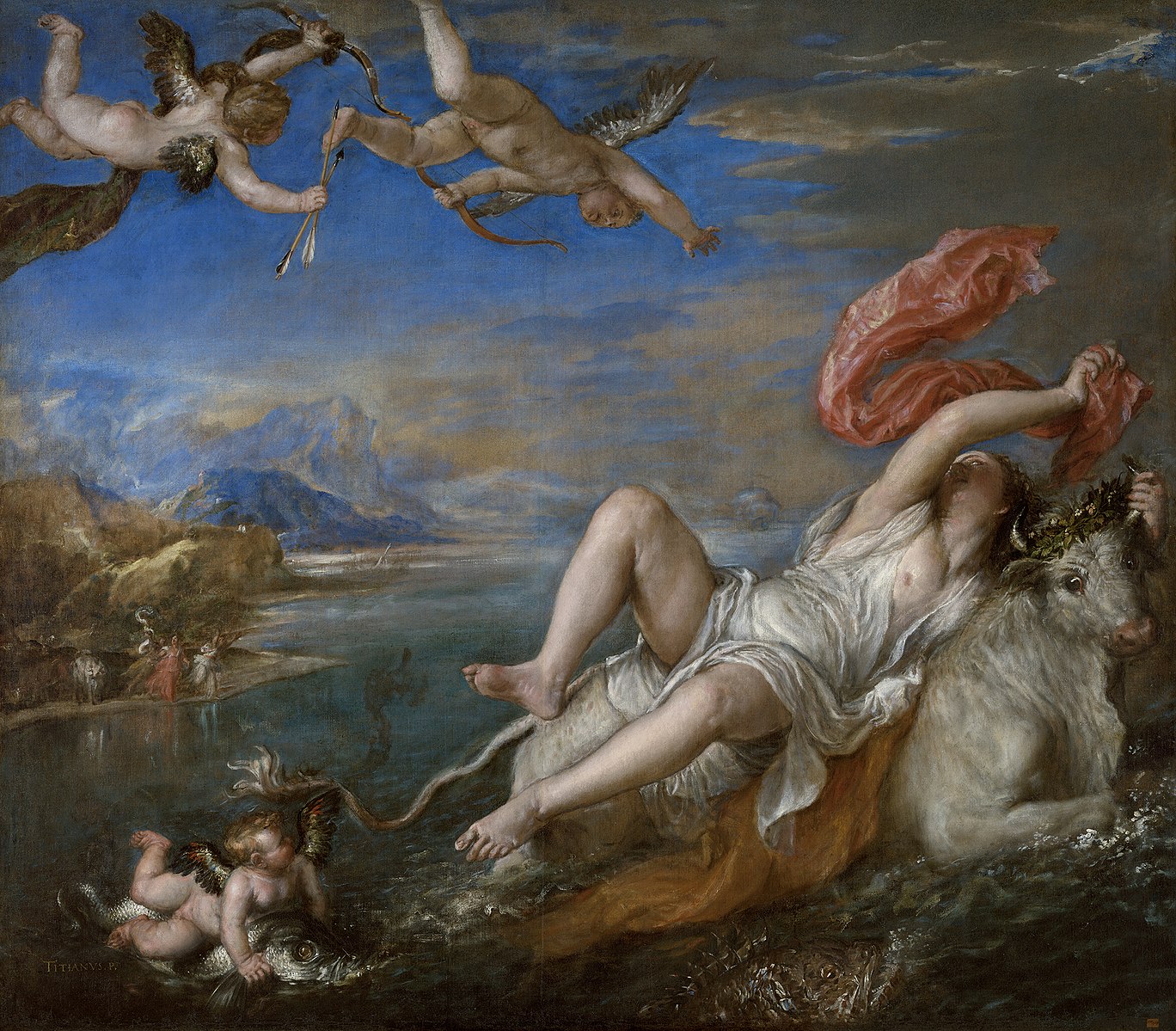
Titian, The Rape of Europa (1560)
- Minerva's narrative tapestry: traditional contest of Minerva & Neptune (Athens) in center, cautionary tales of divine challengers (e.g. Queen Rhodope & King Haemus > mountains, 6.85-102) in corners vs. Arachne's subversive composition at center (6.103-28) – male gods' self-transformations, Jupiter (e.g. Europa, Leda), Neptune, Apollo?
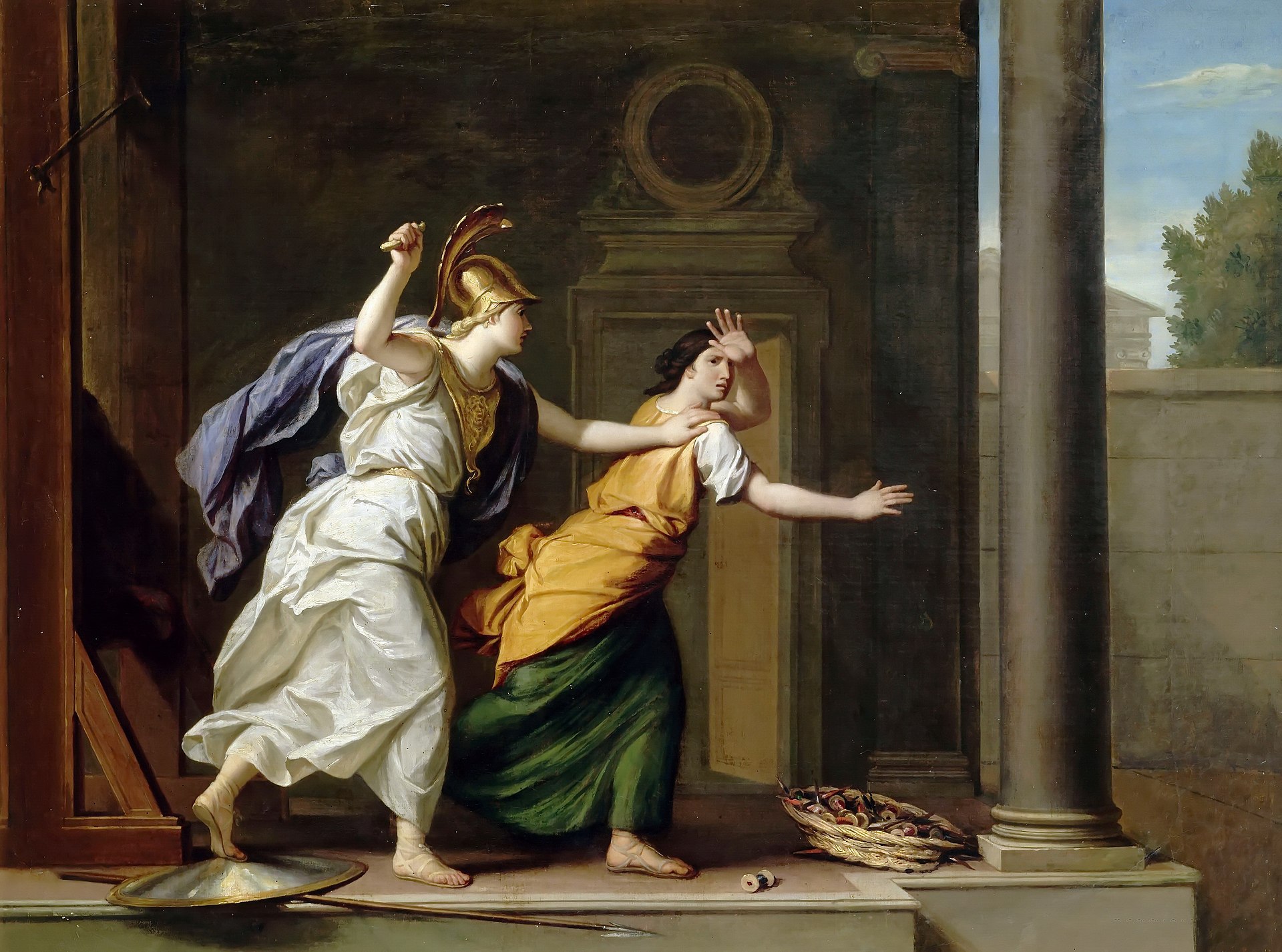
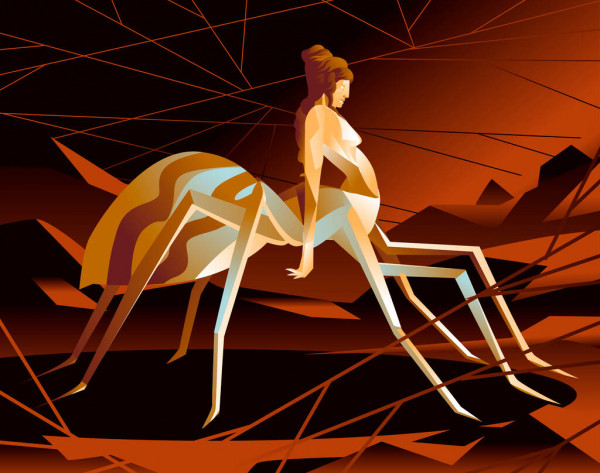
L: Houasse, Minerva and Arachne (1706)
Metamorphoses 6.129ff. (Arachne's brutally censored tapestry – speaking truth to power?)
Neither Minerva nor gnawing Envy could niggle
with her work. Her triumph pained the golden goddess:
she ripped that cloth colored with godly assaults
and, clutching her shuttle of Cytorian boxwood,
hit Arachne three or four times in the head.
The girl couldn't bear it and slipped a noose around
her pounding throat. But Minerva pitied and lifted
her, saying, "Live on, bold girl, but hang all the same.
So you'll be worried for the future as well,
may your line bear this punishment always."
. . .
From [this form] still she spins
out silk, weaving her old webs, now a spider.
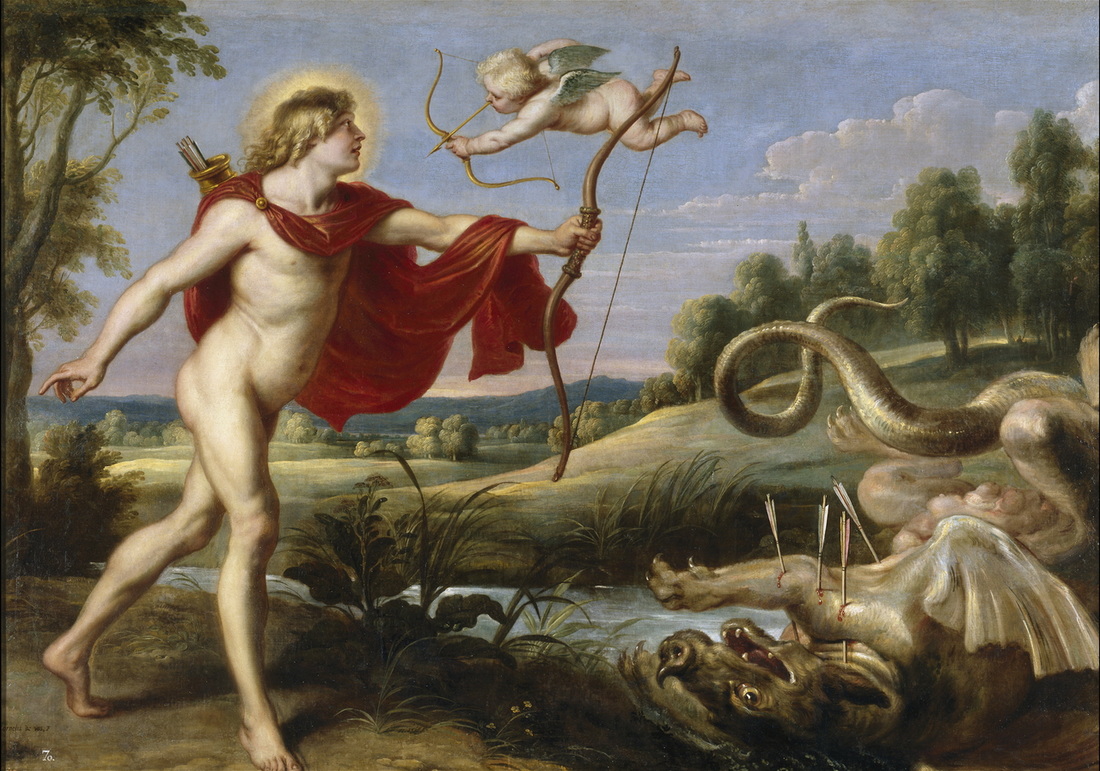
Cornelis de Vos, Apollo and the Serpent Python (ca. 1636)
- Metamorphoses 1: chaos & order > desires of Apollo & Jupiter; first post-creation story = Apollo & Daphne (Apollo slays Python, yields to Cupid's arrows; epic > love poetry)
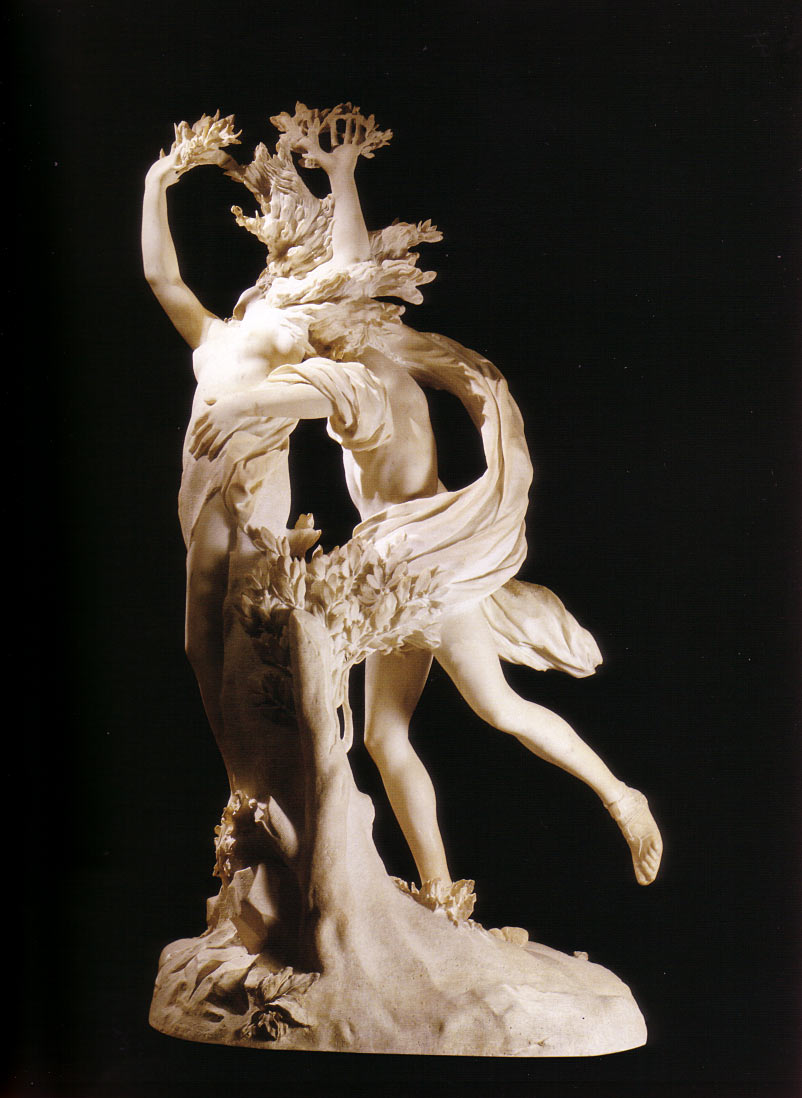
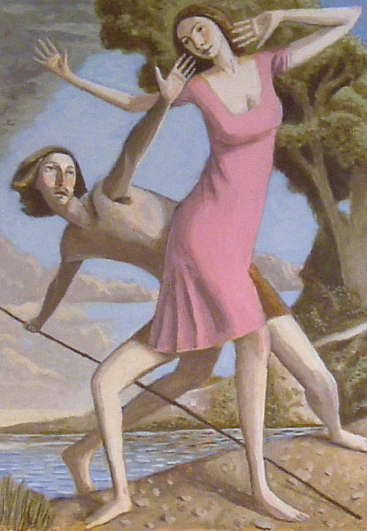
L: Bernini, Apollo and Daphne (ca. 1625)
- Apollo's overpowering desire, male gaze & objectification (hair, body fantasies, 1.497ff.) vs. Daphne's wishes (Diana): Daphne unimpressed by Apollo's pitch, appeal to Peneus & request granted; ambiguous compensation (link with Augustus)?
Metamorphoses 1.548-63 (transformation & Romanized conclusion)
. . . slowness seeps in her limbs,
delicate bark nestles around her soft breasts,
her hair fans into leaves, arms lengthen to branches,
the feet just so quick sink down sluggish as roots,
her face turns leafy crown: all that stays is splendor.
Apollo loves her this way, too, touches the trunk,
can feel the nymph's heart beating beneath the new bark.
Holding a branch like an arm in his own, he kisses
the wood, but even it shrinks away from that kiss.
So the god says, "Since you cannot be my bride,
you will be my tree, laurel, and your leaves
will twine about my hair, quiver, and lute.
You'll be with Roman leaders when the song of glory's
sung and the Capitol sees parades of triumph; [laurel on triumphal chariot]
you'll stand as faithful sentinel by the twin gates
of Augustus and guard the oak wreath hung between. [laurels before emperor's palace & civic (oak-leaf) crown]
And as my head is young, my hair's never shorn,
you too will have forever an evergreen grace."
- aftermath of Daphne's transformation: "The laurel made a sign / with her branches, seemed to shake her leafy crown" (1.566-7); fellow rivers "wonder if they should applaud or console Daphne's father" (1.578)
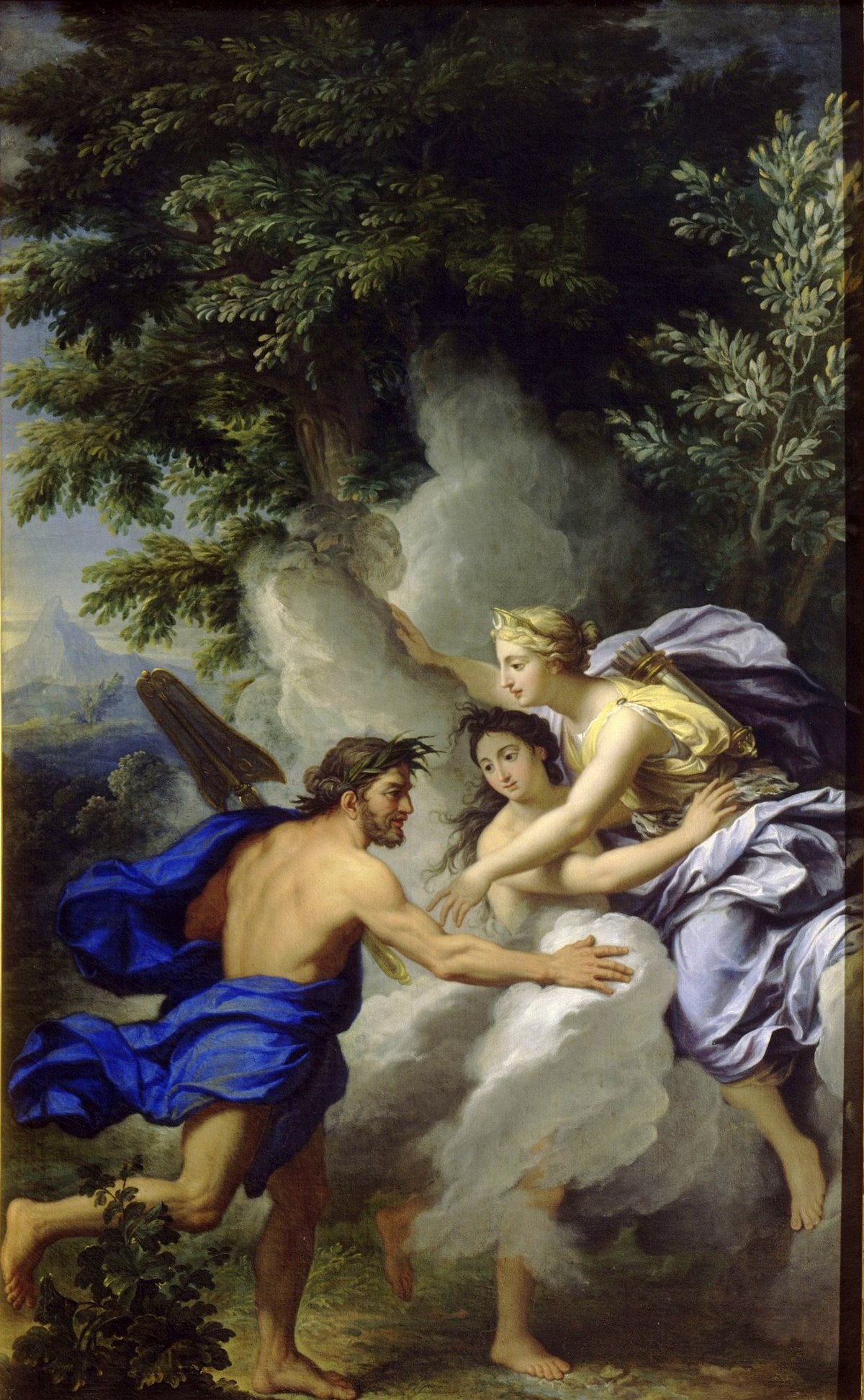
.jpg)
L: Houasse, Alpheus and Arethusa (1668); R: head of Arethusa (Syracusan coin, 405-400 BCE)
- Arethusa's similar story of attempted rape: elaborately nested (Muses, rape of Proserpina) 1st-person story told to Ceres; nymph & hunter, terrifying chase after swim in Alpheus River, appeal to Diana, Arethusa still traumatized after transformation into cloud & stream ("But the river-god knew me / even liquid, shed the man's form he'd assumed, turned / into his water-self so he could flow within me", 5.636-8), escape as freshwater spring, Sicily <> Alpheus River, Greece (aetiological)
- Echo & Narcissus (Thebes, link through Tiresias: boy will live long "As long as he never knows himself", 3.348); theme of self-love (self-looking, "his eyes will be his end"; cf. Lucretius's simulacra-crazed lovers' self-delusion
- Echo's back story (body > voice)? failed pursuit of Narcissus & metamorphosis ("her bones became rock", 3.401)
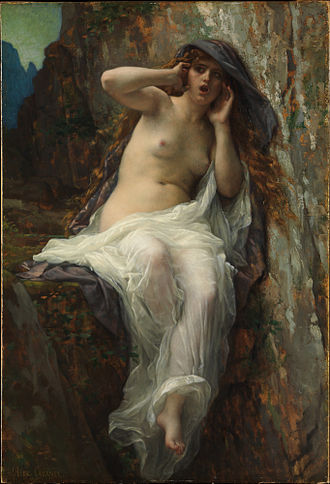
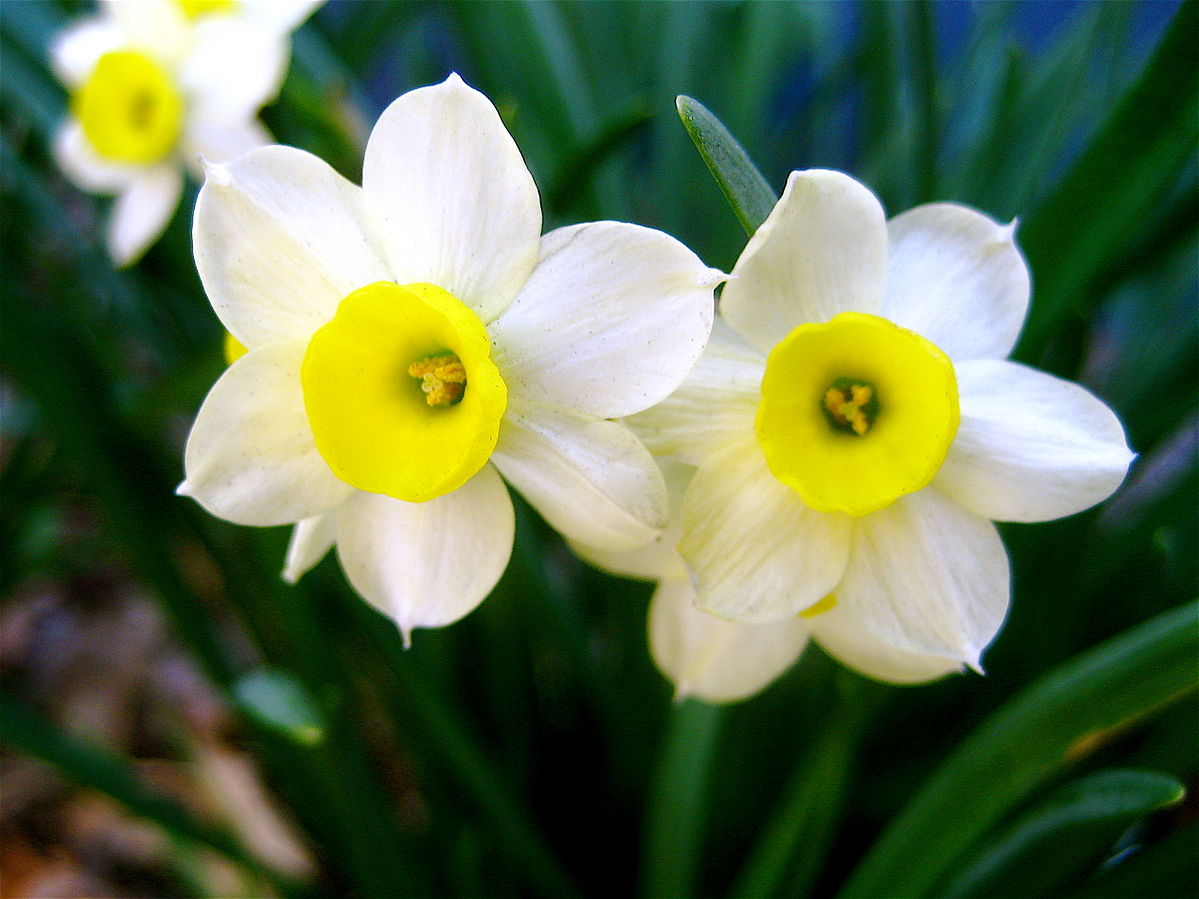 L: Cabanal, Echo (1874); R: Narcissus flower
L: Cabanal, Echo (1874); R: Narcissus flower
Metamorphoses 3.455-73 (Narcissus's realization; destructive paradox of self-love)
"Surely my looks and age
can't repell you—even nymphs have adored me.
What hope your face offers I cannot quite read,
but when I reach for you, you reach for me, too;
when I smile, so do you; and I've spotted tears
on your face when I cry. You signal with nods
and I can guess by your sweet murmuring mouth
that you answer my words with yours—I can't hear.
I am he. I knew, my image doesn't delude me.
I burn with love for myself, fan and feel the same flames.
What do I do? Chase or be chased? Why chase at all?
What I want I have: needing nothing makes me poor.
Oh, if only my body and I could divide!
Odd wish for a lover: to want the loved one to go.
This hopelessness will kill me; I can't have long
to live and will be put out while still young.
But death doesn't disturb me—no more despair.
Only I wish the one I love could live longer.
Now the two of us will die with one breath."
- Metamorphoses 10 (misogynistic Orpheus narrates): Venus's Cyprus and Propoetides (scorners of Venus > first prostitutes): "Pygmalion was sickened by the ingrained flaws / of the female mind and so lived alone" (10.244-5)
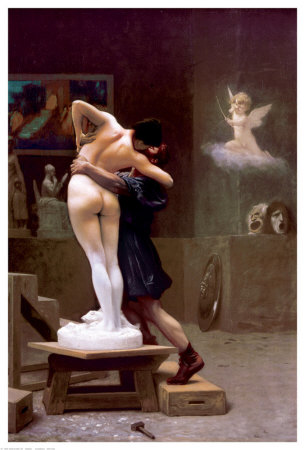
Gérôme, Pygmalion and Galatea (ca. 1890)
- Pygmalion the sculptor: creation of his “ivory girl” (10.276; named Galatea in later texts); desire to mold ideal woman fulfilled
Metamorphoses 10.280-94 (Pygmalion's statue comes to life after he prays to Venus)
At home, he hurried to his modeled girl,
leaned on a couch, and kissed her: Was she really warm?
He brushed her lips again and touched a breast;
when he stroked, the ivory gave, no longer firm
but soft to his touch, as when Hymettian wax
melts in the sun and, turned about one's thumb,
is molded to forms, more pliable with plying.
Amazed, thrilling nervously, afraid that he's wrong,
again and again the lover strokes what he's wished.
It is a live body; veins beat at his thumb!
Then indeed our Paphian hero bursts with words
of thanks for Venus and presses real lips at last
with his own. The girl feels the kisses he gives
and goes pink. Then, lifting shy eyes toward the light,
she sees at once both lover and sky.
Pygmalion theme in film & television: My Fair Lady (1964), Educating Ruby (1983), Can't Buy Me Love (1987), Mannequin (1987), Pretty Woman (1990), La Femme Nikita (1997-2001), Buffy the Vampire Slayer (1997-2003), She’s All That (1999), The Shape of Things (2003), Project Nim (2011), Ruby Sparks (2012), Her (2013), The Makeover (2013), Barbie (?) (2023)
Lars and the Real Girl (2007):
(trailer) https://www.youtube.com/watch?v=XNcs9DrKYRU
https://www.youtube.com/watch?v=lwltl2P5DJA
Metamorphoses 10.250-8 (Pygmalion contemplates representation and reality)
It looks like a real girl you'd think is alive
and longs to be moved, except shyness intrudes—
art masks his art so well. Pygmalion's in awe;
flames of love for the feigned body flick at his heart.
he touches it often with curious hands to see
if it's flesh or ivory—it can't be ivory.
He feels his fingers sink in the limbs and he strokes
and then fears where he's touched might bear a bruise.
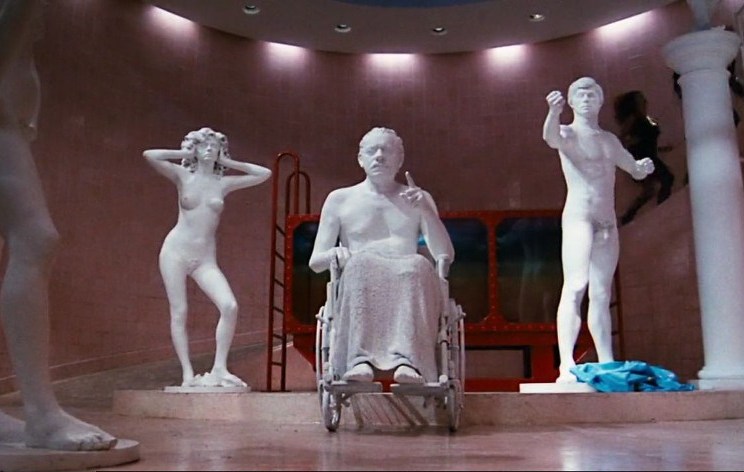
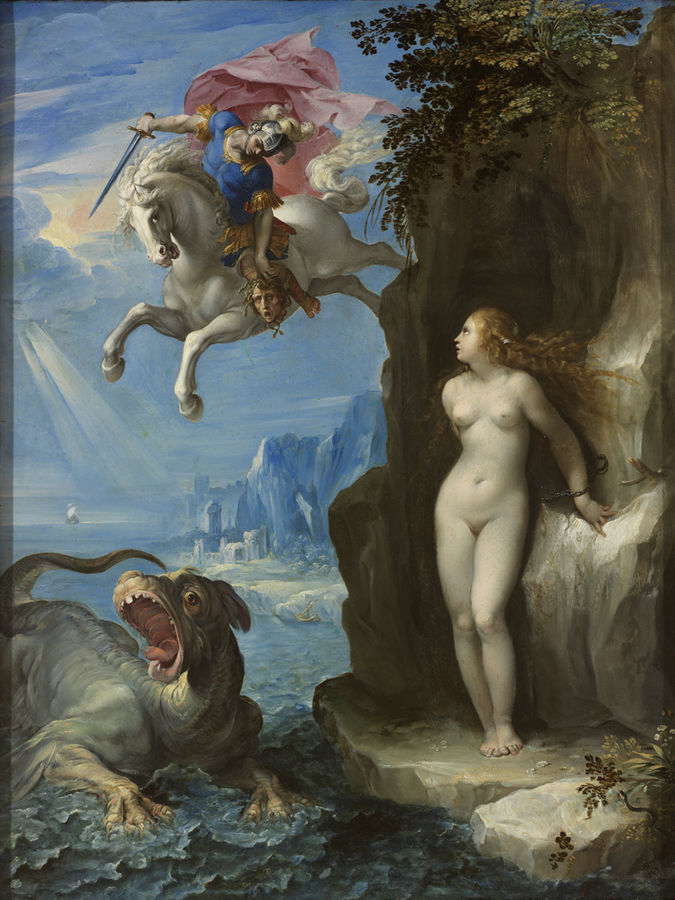
L: "The Medusa" in The Rocky Horror Picture Show (1975); R: Cesari, Perseus & Andromeda (1592)
- Perseus (Andromeda, Medusa): allusive narrative of heroic quest & conquest of Gorgon Medusa ("Looking"?) – alternate focus on Atlas's metamorphosis, courting & rescue of Andromeda, slaying of sea monster; wedding feast & request for story of Medusa's head — Medusa's back story (Neptune, Minerva – double victimization)?
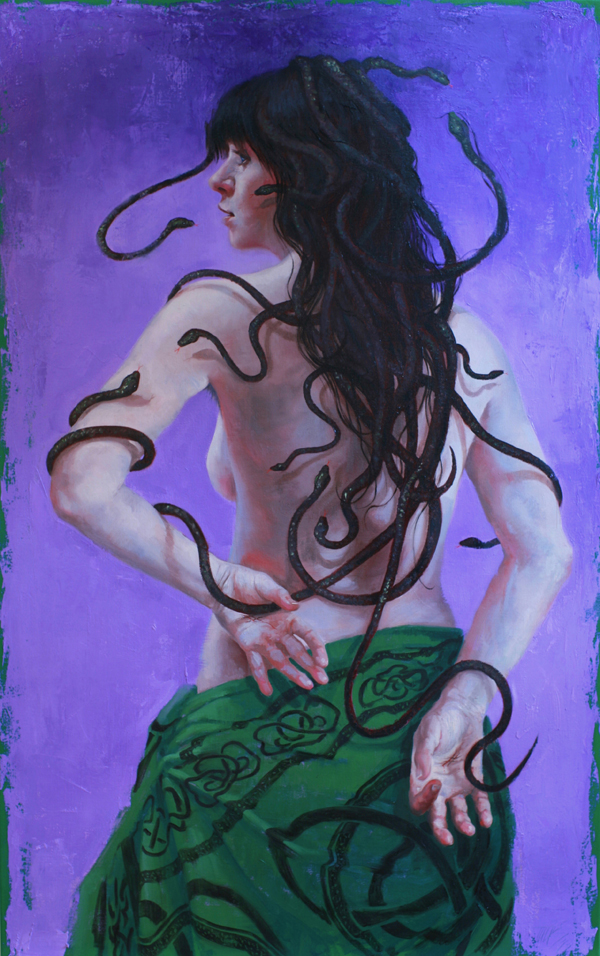
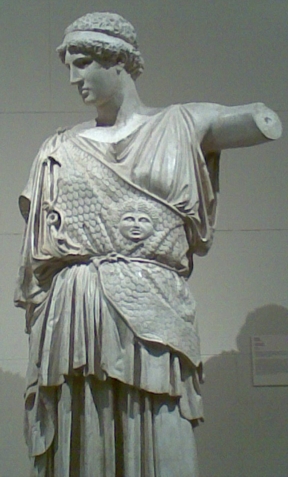
L: Takács, #Me(dusa)too (2018); R: Athena's Aegis (Medusa head)
"When Medusa Meets #MeToo"


.jpg)













.jpg)






